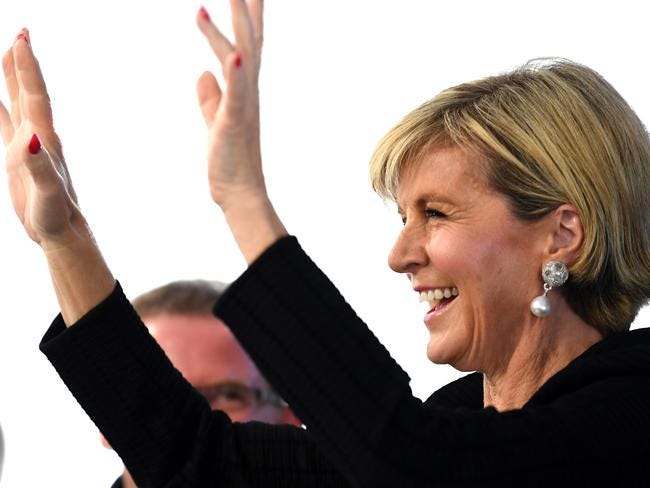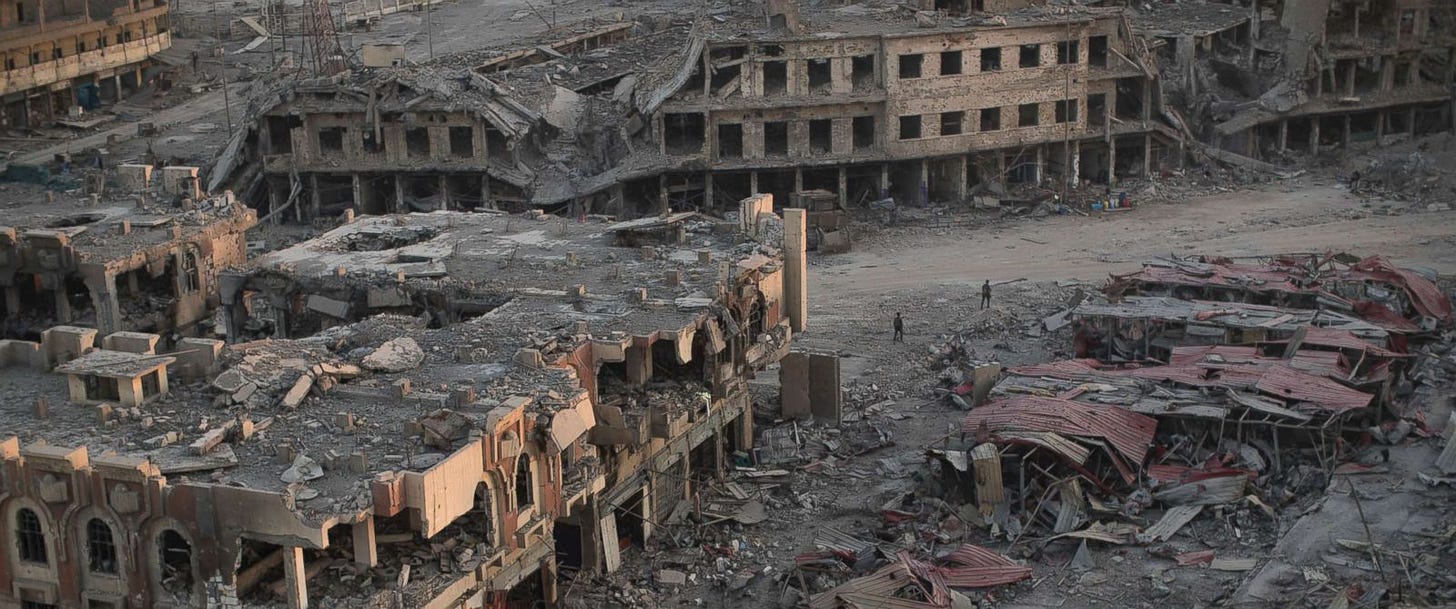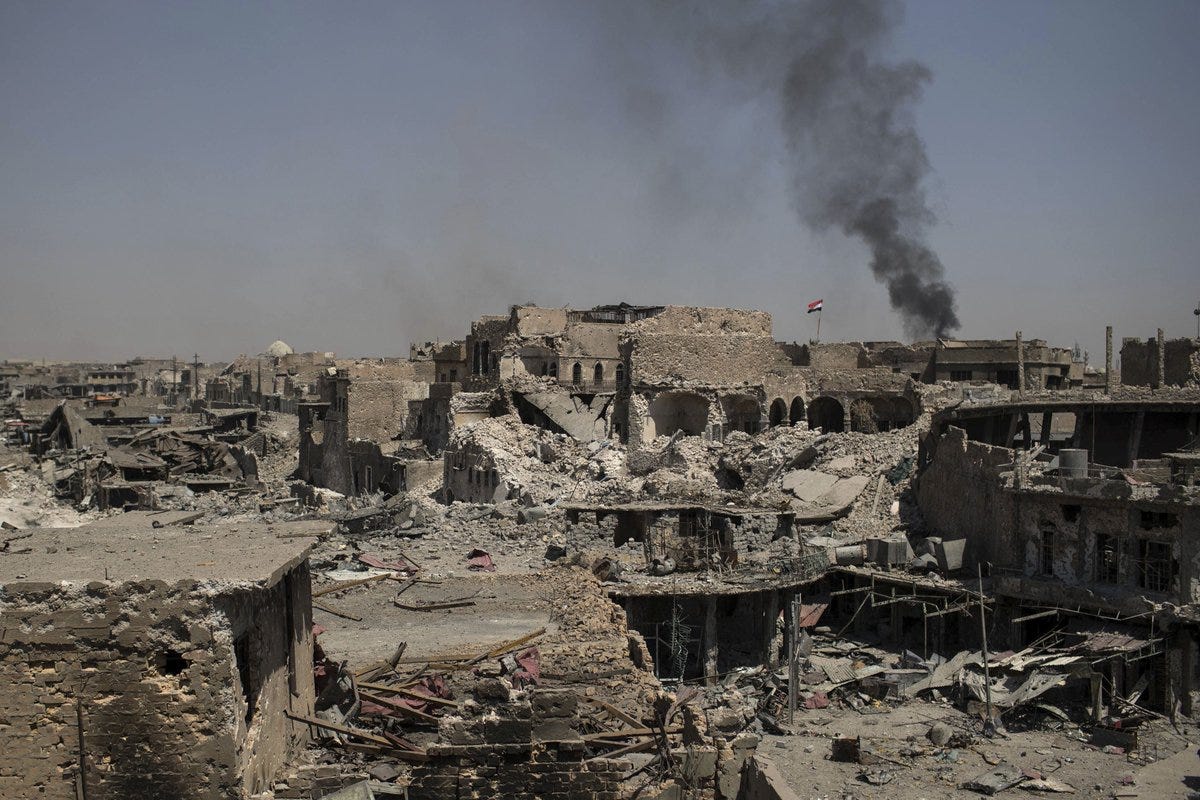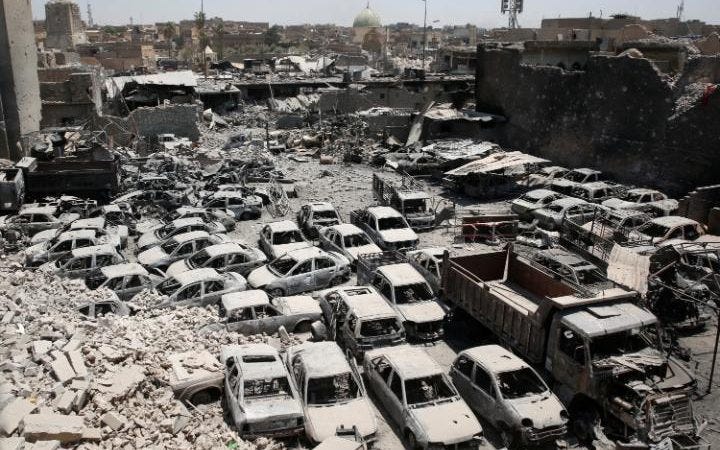
On the ABC's Insiders, the weekly television gabfest review of the news with senior journalists, denoting, laughably, their unique status, in a week when, in a particularly solid report, Amnesty International accused the country of breaches of humanitarian law and war crimes, nothing.
As a journalist Old Alex had been the first to be sceptical of Amnesty International.
Murdoch's News Limited inevitably ignored them.
In this case, the research was solid, the evidence searing.
But the country had no eyes to see, no ears to hear.
The show, every Sunday morning, was one of the flag bearers of the Australian Broadcasting Corporation's journalism.
If it could be called that.
Not a single, solitary word.
The special guest interview of the week was with Foreign Minister Julie Bishop, who had visited Iraq several times, stitching up the deal for sending Australian soldiers into the war zone. Purportedly, it was garbage, at their request.
But here, billions of dollars later, with Mosul in ruins, the smoke still rising and the stench of decaying flesh a pall over the pulverised city, nothing, not a word.
Australia had helped defeat the "death cult" at its core, chased it, so the apparatchiks of government propaganda would have it, into its burrows, but in the moment of victory, not a word.
Too ashamed.
Not something one wanted the public dwelling on, dead bodies. Crying, dying children. Wounded, killed, executed.
Rotting in the inescapable Iraqi heat.
It was an inexcusable decay of public discourse.
And an inexcusable strategic blunder.
But trapped in the ordinary, here in the remote reaches, he was faced with a seaweed world.
The blatant manipulation of the Australian public, the deliberate dumbing down, kept clanging like a clarion call, the muffled discourse, the strange echo, the hollowness.
The social engineers had destroyed the country.
It was sad to see, sad to watch, to experience. The prophets of conscience could scream from the rooftops, they would not be heard.
The old saying: If the majority believe something it is unlikely to be true.
No time more true than now.
As the people were led, blindfolded, to their execution site.
THE BIGGER STORY:

http://www.heraldsun.com.au/news/videos-show-iraqi-forces-beating-executing-detainees-during-mosuls-liberation-from-islamic-state/news-story/18ac27af41f5db24738776db8db8ea4b
VIDEOS allegedly shot in the Mosul area appear to show Iraqi security personnel executing a detainee and brutally beating others, Human Rights Watch said.
Iraq declared victory over Islamic State in Mosul earlier this week after a nearly nine-month battle that ravaged the city and took a heavy toll on residents and security forces.
The videos “appear to show Iraqi soldiers and federal police beating and extrajudicially killing detainees”, the rights group said in a statement that included links to the clips, which were posted on Facebook.

http://www.dailytelegraph.com.au/news/nsw/labor-research-show-voters-believe-julie-bishop-is-better-for-pm/news-story/6ee124b9edb285d987059369ffe2a40d
IF PERSONALITY is as important as policy then a poll commissioned by Labor is not the best news for a prime minister tormented by leadership speculation.
The poll asked focus groups to describe Prime Minister Malcolm Turnbull, and also deputy Liberal leader and Foreign Minister Julie Bishop. Ms Bishop proved to be way more popular, her perceived character far more appealing than that of her boss.
The ALP-commissioned focus group sessions, convened by UMR Research, found participants described Ms Bishop as “intelligent”, “smart” and “strong”. Ms Bishop was also described as being a “leader”, having “talent” and “good” in contrast to the most common descriptions of Mr Turnbull as “arrogant” and “smug”.

https://www.washingtonpost.com/world/middle_east/liberation-from-militants-leaves-devastation-in-mosul/2017/07/14/b3856992-68c9-11e7-94ab-5b1f0ff459df_story.html?utm_term=.b3e89b669373
MOSUL, Iraq — There was a smell of death in Mosul’s Old City when Ayman Hashem came back this week to see what happened to his home. His neighborhood was unrecognizable.
“All that’s left is rubble and the bodies of families trapped underneath,” the 23-year-old said. He flipped through photos on his phone, showing picture after picture of wreckage. His own house was “cut in half,” he said. He had to cover his nose with his tee-shirt because of the smell of buried, rotting bodies.
Iraq’s U.S.-backed forces wrested Mosul from the Islamic State group at the cost of enormous destruction. The nearly 9-month fight culminated with a crescendo of devastation — the blasting of the historic Old City to root out the deeply dug-in militants.

The population, once numbering 3 million, is battered and exhausted, with hundreds of thousands displaced. Without a swift campaign to rebuild Mosul, aid and rights groups warn the current humanitarian crisis will balloon and resentment will likely give way to extremism, undermining the victory.
“If the western half is ignored it will produce a social disaster and this social disaster will create bigger destruction if it’s not addressed,” said Khatab Mohammed al-Najjar, a resident of eastern Mosul who watched the Old City burn from across the Tigris River during the operation.
“West Mosul produced Daesh, and it is very possible it may produce a new Daesh,” he said, referring to west Mosul’s historically more religious and traditional residents. He used the Arabic acronym for IS.
When Iraqi Prime Minister Haider al-Abadi declared victory in Mosul Monday, he pledged reconstruction would begin soon. But his government still struggles to finance day-to-day workings of the state amid low oil prices.




